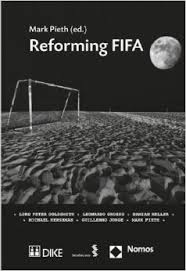Since yesterday FIFA is back in turmoil (see here
and here)
after the FIFA Council decided
to dismiss the heads of the investigatory (Cornel Borbély) and adjudicatory
(Hans-Joachim Eckert) chambers of the Independent
Ethics Committee, as well as the Head (Miguel Maduro) of the Governance
and Review Committee. It is a disturbing twist to a long reform process (on
the early years see our blogs here
and here)
that was only starting to produce some tangible results. More...
Editor's note: Marine Montejo is a graduate from the College of Europe in Bruges and
is currently an intern at the ASSER International Sports Law Centre.
On 3 June
2015, Sepp Blatter resigned as President of FIFA after another corruption scandal inside the world’s football
governing body was brought to light by the American authorities supported by
the Swiss prosecutor office. Two months after Michel Platini announced he would be a candidate for
the next FIFA Presidential election, on 25 September 2015, the Swiss prosecutor
opened an investigation against S.
Blatter on an alleged disloyal payment he authorised to M. Platini. On 8
October 2015, the FIFA Ethics Committee announced both of them were provisionally
suspended upon their hearings, a suspension that was later confirmed by CAS. In the end, M.
Platini was sanctioned with an eight years ban from
all football activities, later reduced to a six years ban by FIFA
Appeal Commission on 24 February 2016. In the meantime, he withdrew his candidacy to become the
next FIFA President. On 9 May 2016, after M. Platini appealed this sanction, the CAS confirmed the suspension but reduced it
to four years, leading to his resignation from the UEFA presidency and the
announcement of his intention to challenge the CAS award in front of the Swiss
Federal Tribunal.
On 19
September, the CAS finally published the full text of the award in the dispute between M.
Platini and FIFA. The award is in French as M. Platini requested that the
procedure be conducted in that language. You will find below a summary of the ‘highlights’
of the 63-page decision. More...
Editor’s note: This report
compiles all relevant news, events and materials on International and European
Sports Law based on the daily coverage provided on our twitter feed @Sportslaw_asser. You are invited to complete this survey via the comments section
below, feel free to add links to important cases, documents and articles we
might have overlooked.
Marine Montejo is a graduate from the College of
Europe in Bruges and is currently an Intern at the ASSER International Sports
Law Centre.
The Headlines
The Belgian Court of Appeal released its
judgment this month regarding Doyen’s legal battle against the FIFA TPO ban.
The Appeal Court confirmed the first instance decision and ruled out any provisional
measures to block the ban’s implementation (for an in depth review, see
our blog post). More importantly, the Court
reaffirmed that Swiss based sport federations are liable in front of EU Members’
States courts when EU competition law is involved. That means the next
important step for this legal battle is whether or not the European Commission
is going to open a formal proceeding (Doyen
already lodged a complaint) to assess the compatibility,
and more importantly, the proportionality of the TPO ban with EU law. Only a
preliminary ruling by the CJEU could hasten the decision if one of the European
national courts, hearing a case brought by Doyen (France or Belgium), decided
to refer a preliminary question.More...
Rien ne va plus at FIFA. The news that FIFA’s Secretary General Jérôme Valcke
was put on leave and released from his
duties has been quickly overtaken by the opening of a criminal investigation targeting
both Blatter and Platini.
With FIFA hopping from one scandal to the next, one
tends to disregard the fact that it has been attempting (or rather pretending) to
improve the governance of the organisation for some years now. In previous
blogs (here and here), we
discussed the so-called ‘FIFA Governance Reform Project’, a project carried out
by the Independent Governance Committee (IGC) under the leadership of Prof. Dr.
Mark Pieth of the Basel Institute on Governance. Their third and final report, published
on 22 April 2014, listed a set of achievements made by FIFA in the area of good
governance since 2011, such as establishing an Audit and Compliance Committee (A&C).
However, the report also indicated the reform proposals that FIFA had not met.
These proposals included the introduction of term limits for specific FIFA
officials (e.g. the President) as well as introducing an integrity review
procedure for all the members of the Executive Committee (ExCo) and the
Standing Committees. More...
Editor’s
note: Chuck Blazer declined our official interview request but thanks to some trusted
sources (the FIFA indictment and
Chuck’s testimony) we
have reconstructed his likely answers. This is a fictional interview. Any resemblance with real facts is purely coincidental.

Mr
Blazer, thank you for agreeing to this interview, especially considering the
circumstances. How are you doing?
I am facing ten charges concerning, among others,
conspiracy to corrupt and money laundering. But apart from that, I am doing
great (laughs)!
It is
good to know that you have not lost your spirit. And since you’ve been involved
in football, or as you call it soccer, for years could you please first tell us
what was your career at FIFA and its affiliates like?
Let me see… Starting from the 1990s I was employed by and
associated with FIFA and one of its constituent confederations, namely the
Confederation of North, Central American and Caribbean Association Football (CONCACAF).
At various times, I also served as a member of several FIFA standing
committees, including the marketing and television committee. As CONCACAF’s
general secretary, a position I proudly held for 21 years, I was responsible,
among many other things, for negotiations concerning media and sponsorship
rights. From 1997 to 2013 I also served at FIFA’s executive committee where I
participated in the selection process of the host countries for the World Cup
tournaments. Those years at the helm of world soccer were truly amazing years
of travel and hard work mainly for the good of the beautiful game. I might add
that I even managed to document some of my voyages on my blog. I initially
called it “Travels with Chuck Blazer” but Vladimir (Putin) convinced me to
change the name to “Travels
with Chuck Blazer and his Friends”. You should check it out.
More...
Editor’s note: This short book review will be
published in a different format in the International Sports Law Journal, due to
its timeliness we decided to reproduce it here.
Reforming
FIFA, or Not
Antoine Duval
Book Review: Mark Pieth
(ed.), Reforming
FIFA, Dike Verlag, St. Gallen, 2014, 28.00 CHF, p.178

This
book looks back at the work of the Independence Governance Committee
(IGC). This Committee, constituted in 2011, had as
primary objective to drive a reform process of FIFA initiated by its President
Sepp Blatter. After ordering from the Swiss anti-corruption expert Mark Pieth,
a report
on the state of FIFA’s governance, FIFA decided to mandate him with the leadership
of a consulting body composed of a mix of independent experts and football
insiders, which would be accompanying and supervising the internal reform
process of FIFA. The IGC was officially dissolved
at the end of 2013, after completing its mandate. The book is composed of eight
chapters, written by former members of the IGC, including former chairman Mark
Pieth. In addition to the chapters, it includes the different reports
(available here,
here
and here)
submitted by the IGC to FIFA across the years. In the words of Pieth, this
account is “fascinating because it gives a hands-on, realistic perspective of
the concrete efforts, the achievements and the remaining challenges in the
struggle for the reform of this organization [FIFA], avoiding the usual
glorification or vilification.”[1]
This review will first summarize the core of the account of the FIFA reform
process provided by the book, before critically engaging with the outcome of
the process and outlining the deficiencies that culminated on 29 May 2015 with
the re-election of Sepp Blatter as FIFA president.More...
After the success of this year’s World Cup in Brazil, FIFA President
Sepp Blatter can start concentrating on his Presidential campaign for next
June’s FIFA elections. Even though the 78-year old Swiss is not officially a
candidate yet, he is still very popular in large parts of the world, and
therefore the favourite to win the race. Nonetheless, even for the highly
experienced Mr. Blatter these elections will be different. All candidates will
have to respect the newly introduced Electoral Regulations for the FIFA Presidency. More...
Qatar’s successful bid to host the 2022 World Cup left many people
thunderstruck: How can a country with a population of 2 million people and with
absolutely no football tradition host the biggest football event in the world?
Furthermore, how on earth can players and fans alike survive when the
temperature is expected to exceed 50 °C during the month (June) the tournament
is supposed to take place?
Other people were less surprised when FIFA’s President, Sepp Blatter,
pulled the piece of paper with the word “Qatar” out of the envelope on 2
December 2010. This was just the latest move by a sporting body that was reinforcing
a reputation of being over-conservative, corrupt, prone to conflict-of-interest
and convinced of being above any Law, be it national or international.More...